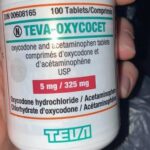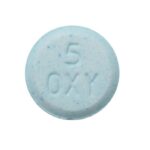Are Oxycocet the same as Oxycodone?

Oxycodone is used to relieve moderate to severe pain. Oxycodone extended-release tablets and extended-release capsules are used to relieve severe pain in people who are expected to need pain medication around the clock for a long time and who cannot be treated with other medications. Oxycodone extended-release tablets and extended-release capsules should not be used to treat pain that can be controlled by medication that is taken as needed.
Oxycodone extended-release tablets, extended-release capsules, and concentrated solution should only be used to treat people who are tolerant (used to the effects of the medication) to opioid medications because they have taken this type of medication for at least one week. Oxycodone is in a class of medications called opiate (narcotic) analgesics. It works by changing the way the brain and nervous system respond to pain.
On the other hand, Oxycocet is a combination pain medication containing acetaminophen and oxycodone and is very common in Canada. Acetaminophen belongs to the group of medications called analgesics (pain relievers) and antipyretics (fever reducers).
Are Oxycocet the same as Oxycodone?
No, Oxycocet in addition to containing oxycodone also contains acetaminophen, another pain reliever. Acetaminophen belongs to a class of drugs called analgesics (pain relievers) and antipyretics (fever reducers). The exact mechanism of action of acetaminophen is not known. It may reduce the production of prostaglandins in the brain. Prostaglandins are chemicals that cause inflammation and swelling. Acetaminophen relieves pain by elevating the pain threshold, that is, by requiring a greater amount of pain to develop before a person feels it. It reduces fever through its action on the heat-regulating center of the brain. Specifically, it tells the center to lower the body’s temperature when the temperature is elevated.
Oxycodone is also available in combination with acetaminophen in the following products; Oxycet, Percocet, Roxicet, Xartemis XR, others); aspirin (Percodan); and ibuprofen. This monograph only includes information about the use of oxycodone alone. If you are taking an oxycodone combination product, be sure to read information about all the ingredients in the product you are taking and ask your doctor or pharmacist for more information.
What are the side effects of Oxycocet?
The following side effects have been reported by at least 1% of people taking Oxycocet. Many of these side effects can be managed, and some may go away on their own over time.
Contact your doctor if you experience these side effects and they are severe or bothersome. Your pharmacist may be able to advise you on managing side effects.
• constipation
• dizziness
• drowsiness
• itching
• lightheadedness or feeling faint
• mood changes
• nausea
• vomiting
Although most of the side effects listed below don’t happen very often, they could lead to serious problems if you do not check with your doctor or seek medical attention.
Check with your doctor as soon as possible if any of the following side effects occur:
• agitation
• blurred or double vision or other changes in vision
• confusion
• difficulty sleeping
• dizziness when rising from a lying down or sitting position
• dry mouth
• false sense of well-being
• general feeling of discomfort or illness
• hallucinations
• loss of appetite
• muscle twitching
• nervousness
• nightmares or unusual dreams
• pain in lower back or side
• redness or flushing of the face
• signs of an allergic reaction (e.g., hives, itching, or skin rash)
• signs of liver problems (e.g., nausea, vomiting, diarrhea, loss of appetite, weight loss, yellowing of the skin or whites of the eyes, dark urine, pale stools)
• sore throat and fever
• symptoms of urinary retention (e.g., decrease in the amount of urine, or difficult or painful urination)
• unusual excitement (especially in children)
Stop taking the medication and seek immediate medical attention if any of the following occur:
• convulsions (seizures)
• signs of a serious allergic reaction (e.g., abdominal cramps, difficulty breathing, nausea and vomiting, or swelling of the face and throat)
• signs of breathing problems (e.g., shallow, irregular breathing, or slow or troubled breathing)
• symptoms of overdose (e.g., cold, clammy skin, abnormally slow or weak breathing, severe dizziness, confusion, slow heartbeat, or extreme drowsiness)
Some people may experience side effects other than those listed. Check with your doctor if you notice any symptom that worries you while you are taking this medication.
What are the side effects of Oxycodone?
Oxycodone may cause side effects. Tell your doctor if any of these symptoms, are severe or do not go away:
• dry mouth
• stomach pain
• drowsiness
• flushing
• headache
• mood changes
Some side effects can be serious. If you experience any of these symptoms, call your doctor immediately or get emergency medical help:
• changes in heartbeat
• agitation, hallucinations (seeing things or hearing voices that do not exist), fever, sweating, confusion, fast heartbeat, shivering, severe muscle stiffness or twitching, loss of coordination, nausea, vomiting, or diarrhea
• nausea, vomiting, loss of appetite, weakness, or dizziness
• inability to get or keep an erection
• irregular menstruation
• decreased sexual desire
• chest pain
• hives
• itching
• rash
• swelling of the face, throat, tongue, lips, eyes, hands, feet, ankles, or lower legs
• hoarseness
• difficulty breathing or swallowing
• seizures
• extreme drowsiness
• lightheadedness when changing positions





